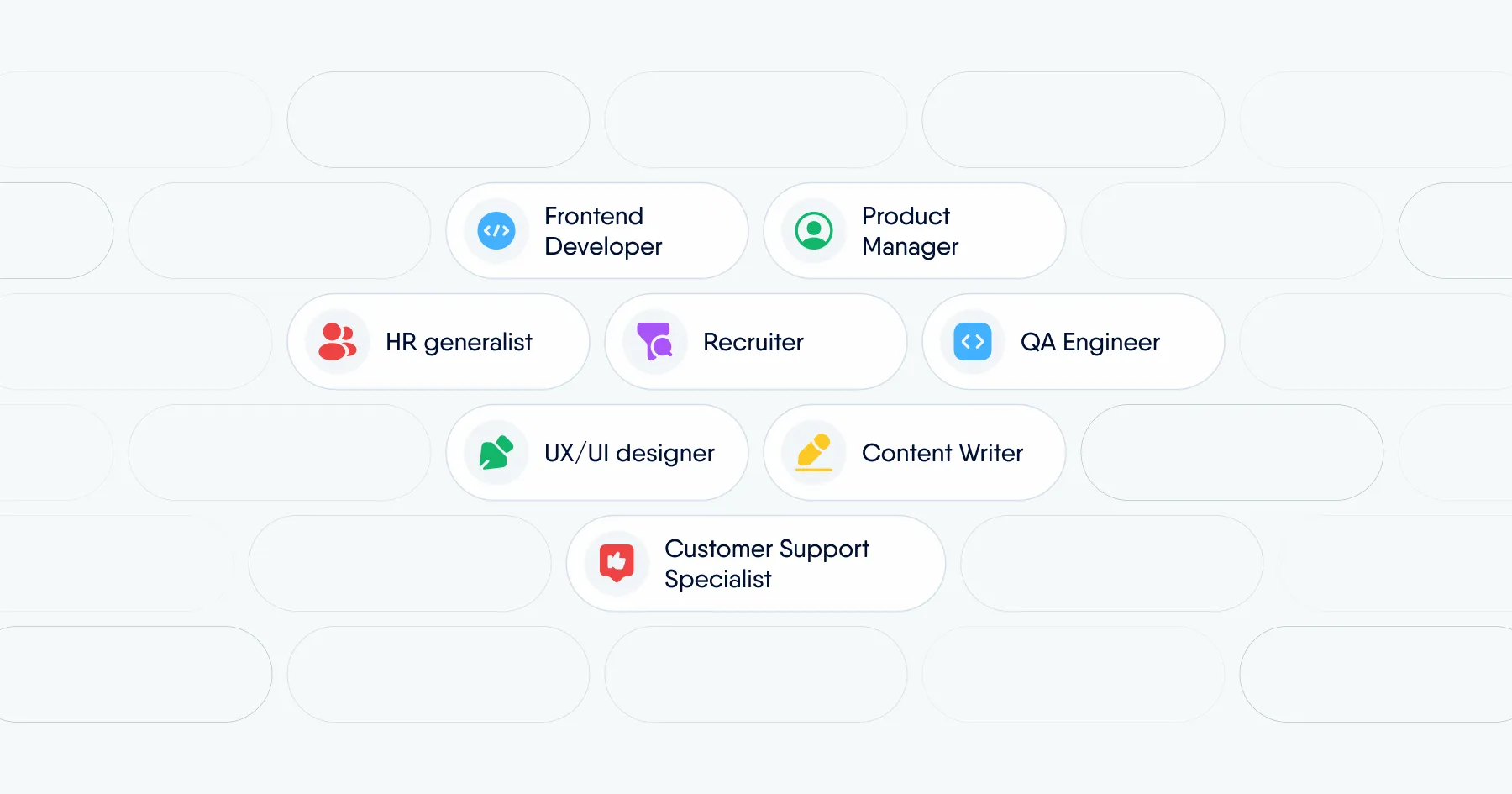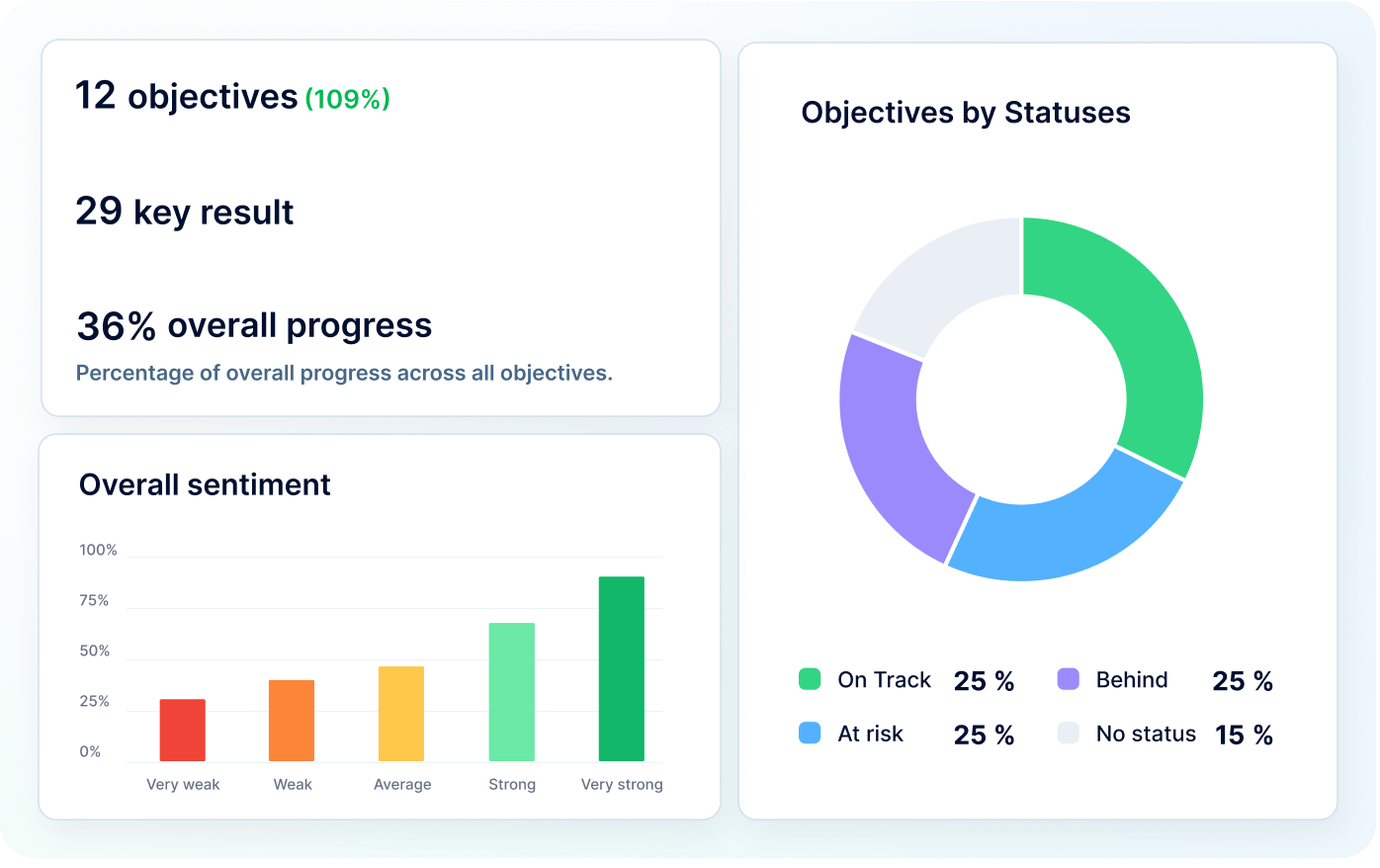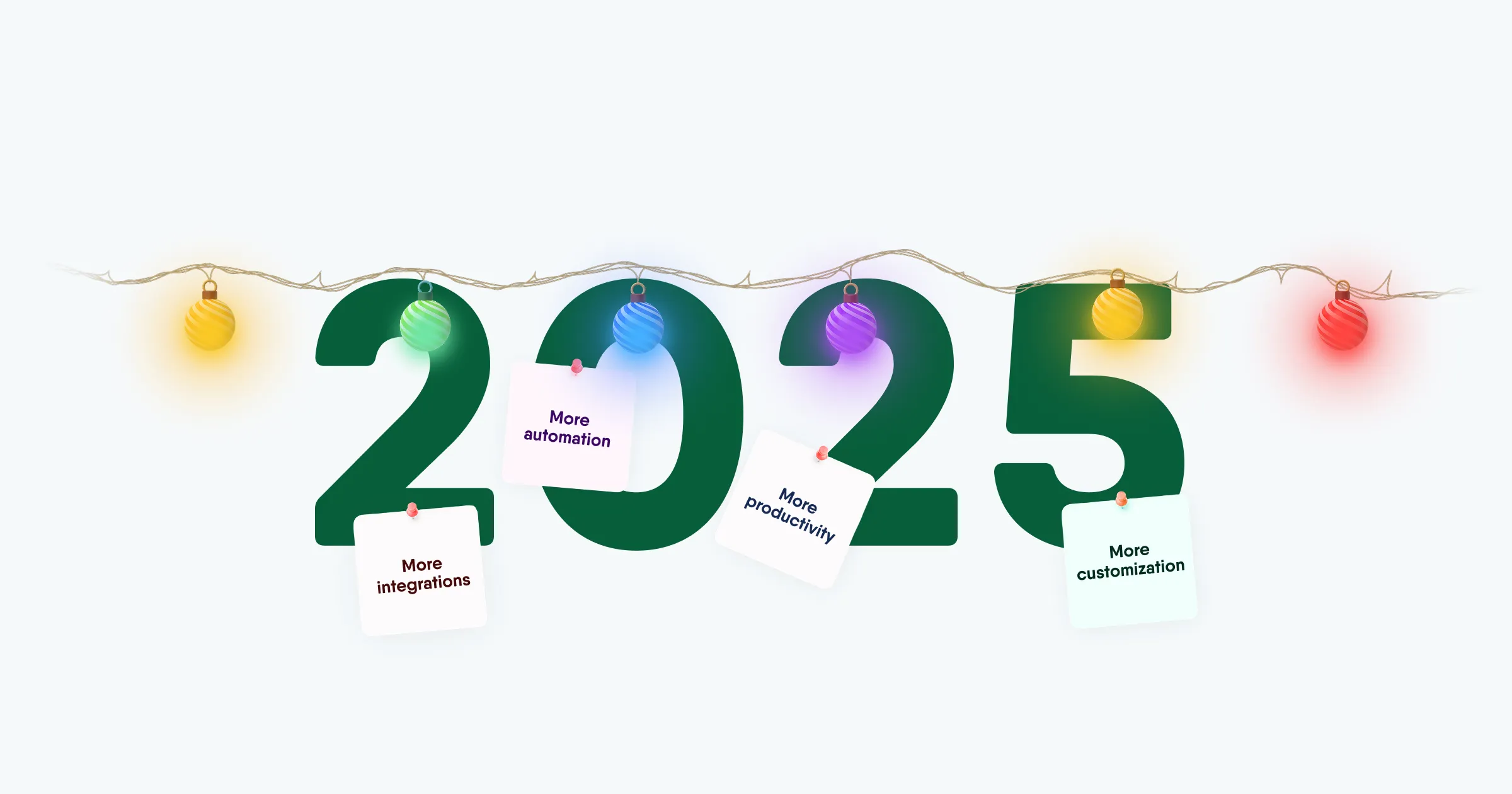
Will AI take our jobs? Myths and truths about the 8 popular IT and tech roles
It feels like everyone and anyone has something to say about AI creeping up on repetitive, routine tasks – and maybe even stealing our jobs with the press of a single magic button.
But how much of that is true today? Let’s take a look at eight popular roles in the tech industry and separate myths from truths.
Who’s this article for?
- Recruiters who are wondering whether it’s still worth opening roles in these areas – or if it’s time to skip them altogether and embrace AI instead.
- Anyone who finds their job on this list and is tired of hearing “AI will replace you soon.”
- Leaders and decision-makers – whether you're already preaching AI, this might shake up what you think you know.
Could AI replace the recruiter?
Let’s be honest – if you’ve ever been hit with the “sell me this pen” question during a first-round screen, you probably wanted half the recruiting world replaced by an AI that just checks skills and spits out an unbiased summary. But is it really that simple?..
Myth: Recruiters are outdated. AI agents scan resumes faster, filter candidates better, and overall make the hiring process smoother and smarter.
What do experts say:
- While 63% of HR leaders believe AI can contribute to financial success, they primarily see it as a tool rather than a replacement for people. AI adoption in HR still lags behind IT: only 55% of HR employees are confident in its business impact, compared to 68% in IT.
- Jason Lauritsen, Workplace Futurist: “In 2025, AI will be responsible for 20% of all hiring decisions, making it an essential tool for recruiters and hiring managers.” Lauritsen emphasizes that although AI is reshaping recruitment, top-performing organizations leverage it to handle repetitive tasks, allowing recruiters to dedicate more time to nurturing relationships and enhancing the candidate experience.
- Recent studies from Harvard Business Review suggest that companies using AI-human hybrid approaches see better hiring outcomes compared to those relying solely on either AI or human recruiters. These data point toward collaboration rather than replacement.
AI can handle the workflow, sure – but it’s terrible at empathy. It can’t sense culture fit, understand team dynamics, or read between the lines of a candidate’s story. For now, these elements remain important in a company’s life, and AI can act as an assistant, relieving recruiters or hiring managers of routine tasks.
Could AI replace the HR generalist?
You’ve got policies, onboarding, payroll, performance reviews, and one million Slack pings about “can I take next Friday off?” Honestly, if an AI could handle half of that, why not let it? But here’s the catch.
Myth: AI will fully replace HR generalists by automating admin tasks, tracking performance, and keeping everything in line with labor law – faster and cheaper.
What do experts say:
- “AI is not about replacing humans but empowering them. By automating repetitive tasks, AI allows HR professionals to focus on what truly matters – building relationships, fostering engagement, and driving organizational culture. However, we must remain vigilant about ethical concerns like bias and privacy to ensure AI serves as a tool for enhancement rather than disruption”, says Dan Beck, President and Chief Product Officer for SAP SuccessFactors.
AI’s great at reminders, reports, and policy enforcement. But when it comes to real human needs like navigating messy team dynamics, managing emotions, or mediating tough conversations – it’s still painfully robotic. HR generalists don’t just execute tasks; they hold the culture together. Besides culture, there are other aspects, like team check-ins, compliance, whistleblowing, and more – nuances that AI cannot handle, as it simply can’t make the right ethical decisions.
AI is not a replacement, but a powerful augmentation tool. Those who recognize this early and integrate AI into their workflows will gain a significant competitive advantage.
Could AI replace the QA engineer?
Automated tests, visual regression tools, AI-powered bug detectors… At this point, it feels like even your toaster could run a smoke test. But here’s what’s really going on.
Myth: AI testing tools will fully replace QA engineers – they’re faster, more precise, and can cover 10x more test cases without lunch breaks.
What do experts say:
- “We still need to have all the skills and knowledge that we’ve always needed. You can’t blindly take answers or code generated by AI and use them. You have to know whether the tools are giving you correct information and well-designed code", says Lisa Crispin, Agile Testing Expert.
- AI handles the tedious work – running repetitive tests, maintaining fragile scripts, and managing endless regressions – freeing you to focus on what really matters: exploratory testing, strategic planning, and in-depth analysis, TestLeaf tells us.
- Forbes reports that while AI can automate up to 70% of routine testing, complex edge cases still require human testers.
AI can run tests, sure. But it doesn’t understand business logic, user expectations, or weird edge cases that happen only in production. Good QA isn’t just checking boxes – it’s critical thinking, curiosity, and asking, “What if the user does something stupid?”
Could AI replace the Frontend developer?
Why write code from scratch when Copilot can build the whole page layout – and even throw in some Tailwind classes while it’s at it? Tempting, right?
Myth: With AI coding assistants, frontend devs are obsolete. You describe a component, and it builds it. Done.
What do experts say:
- “I think the most likely scenario is that tools like GPT-4 become integrated into developer tooling, and used to amplify what a skilled developer can do.” — Josh W. Comeau, Frontend Developer
- A 2024 Dev.to article highlights that AI tools can accelerate coding but struggle with architectural decisions and accessibility concerns.
- Tsh.io research shows AI boosts productivity but cannot fully replace frontend developers, especially for complex UI/UX considerations.
AI can help build, but it doesn’t design for experience. It doesn’t understand trade-offs in performance, accessibility, or UX flow. And let’s not forget: debugging weird browser behavior still takes a human with grit and Google-fu.
Could AI replace the Product manager?
AI can write user stories, analyze metrics, summarize customer feedback, and even create roadmaps. Do we still need PMs, or can we just ask ChatGPT what to develop next?
Myth: AI will make product managers irrelevant by automating strategy, planning, and team coordination.
What do experts say:
- Airfocus (2025) survey finds 92% of product managers believe AI will significantly impact their role but not replace the need for strategic decision-making.
- Lenny Rachitsky, angel investor and top writer, notes AI can automate routine PM tasks, but leadership, stakeholder management, and prioritization require humans.
- Product School emphasizes AI’s role as a tool, not a replacement, for product managers who need to interpret customer needs and lead teams.
AI can suggest, but can’t decide. It doesn’t sit in meetings, negotiate priorities, or translate founder chaos into a roadmap engineers will follow. PM work is 80% communication, alignment, and intuition – not just feature descriptions.
Could AI replace the UX/UI designer?
Drag, drop, prompt, boom – Figma plugin generates the whole dashboard UI. Who needs designers when Midjourney or Galileo can do the job?
Myth: AI tools can generate UIs faster and prettier than human designers, making the role redundant.
What do experts say:
- UX Design Institute (2024): AI tools help automate design components but cannot replace designers’ empathy and human-centered thinking.
- Akkio notes AI can speed up prototyping but lacks the creativity and cultural context that designers bring.
- Coursera highlights AI’s role in enhancing UX research but states that full design requires human intuition and understanding.
A good-looking screen isn’t the same as a good user experience. Designers think in flows, systems, user behavior, and accessibility. AI lacks empathy, intent, and understanding of how and why people interact with interfaces. It also cannot anticipate the team’s vision, the subtle nuances of interaction, or the multiple iterations needed to refine a product – no matter how sophisticated the AI is, these aspects require human insight and collaborative decision-making.
AI can suggest, but can’t decide. It doesn’t sit in meetings, negotiate priorities, or translate founder chaos into a roadmap.
Could AI replace the Customer support specialist?
AI already handles FAQs, responds instantly, and never loses patience. Sounds like a dream… until someone’s integration breaks on a Friday night.
Myth: Chatbots and AI assistants will handle 100% of support tickets – no humans needed.
What do experts say:
- HubSpot’s 2024 report: 80% of customer support specialists say AI helps them work more efficiently but doesn’t replace human empathy.
- Forbes reports AI chatbots can handle basic queries, but complex or emotional issues still need humans.
- BT Group warns AI could lead to up to 10,000 customer service job cuts but emphasizes the ongoing need for human agents in sensitive cases.
AI handles routine, but when things get messy – bugs, billing errors, emotional clients – it falls apart fast. Great support requires calm under pressure, product understanding, and knowing how to say, “I hear you,” like a real person. Often, support cuts happen not because of workload alone, but because AI or impersonal systems can’t build real relationships with clients, which humans do naturally.
Could AI replace the Content writer?
ChatGPT writes blog posts in seconds, rewrites landing pages, and even throws in a call to action that sounds... kinda okay. So why keep a human around?
Myth: AI can generate high-quality content faster, cheaper, and in any tone. Writers are just middlemen now.
- Gartner (2024) predicts that by 2026, up to 30% of marketing content will be generated with AI assistance, but human oversight and creativity remain essential.
- Ann Handley, a leading marketing expert, says: “AI can help generate ideas and drafts, but real storytelling and emotional connection require a human touch.”
- HubSpot’s 2024 report notes that 45% of companies use AI to assist content creation, yet 70% still rely on human editors to maintain brand voice and quality.
AI can generate text. But it doesn’t know your audience, brand voice, context, or strategy. It can’t interview a customer, craft a narrative, or say something truly original. Great content isn’t just readable – it’s relevant, insightful, and human. You can’t automate nuance. Besides, in an era where companies aim not just to operate but to build relationships with customers and tell their brand story, consistency, a human approach, and attention to detail are essential.
Summary: Is AI a replacement or..?
AI is not a replacement, but a powerful augmentation tool. Those who recognize this early and integrate AI into their workflows will gain a significant competitive advantage.
While AI excels at automating repetitive tasks, analyzing large datasets, and accelerating processes, it still lacks:
- Intuition and contextual understanding. AI cannot grasp the subtle nuances of company culture or personal motivation.
- Emotional intelligence and empathy are essential for building trust and reading non-verbal cues, which are critical in recruitment, HR, and customer relations.
- Creative judgment and critical thinking are essential in product management, design, QA, and content creation.
- Human connection and relationship-building are the foundation of effective communication and collaboration.
While AI shows great potential, it is unlikely to replace the majority of tech professionals completely anytime soon. Significant advancements – particularly in emotional intelligence, contextual understanding, and complex decision-making – are required before such a shift becomes feasible.
Until then, AI remains a powerful tool that highlights human capabilities by automating routine tasks and analyzing data at scale.
With over five years in HR tech content creation, Maria explores how technology, people, and culture shape the workplace of today. Her interests include HR, AI, IT, and personal development, and she brings a data-driven, human-centered perspective to her writing.
Get started with PeopleForce today
Automate your HR routine to create a high performance culture in your company. PeopleForce is your best HRM alternative to stay business driven but people focused.

Recent articles
10 prompts to turn ChatGPT into your ultimate HR and recruiting assistant
With tools like ChatGPT, you can delegate routine tasks – let's see how you can do it easily.
50 must-have HR resources for 2025: books, podcasts, and more
Stay ahead in HR with these 50 essential resources for 2025 – books, podcasts, and tools to keep you informed and inspired.
What shapes the near future of HR? All about HR trends for 2025
Discussing the latest industry trends together with the top European HR experts.

